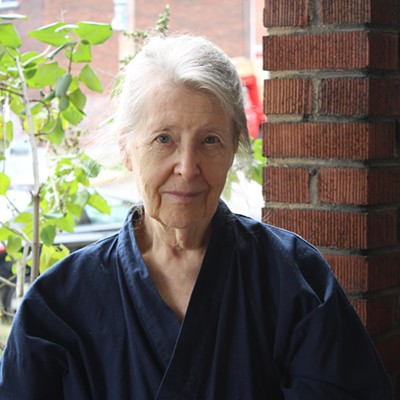If clothes make the man, then Irwin Winkler's De-Lovely, a biopic about the life of Cole Porter, is a very well-dressed mannequin.
Filled with Porter's highly entertaining music, and lusciously costumed on old-style Hollywood sets, it makes a somewhat effete effort to parse Porter's odd marriage to Linda Lee Thomas (Ashley Judd), a wealthy socialite who, we're led to believe, was generally quite satisfied to be madly in love with Porter (Kevin Kline) and yet to let him spend their long married life dallying with man after man. But always discreetly, we're told: "Let's just say you like men more than I do," Linda reflects, with a sophisticated grin, to explain her acquiescence to his desire. Porter states it somewhat more lasciviously: Linda, he tells his young Russian lover (of the moment), gets "everything that happens in the daylight."
You can say the word "love" only so many times before it loses all meaning, and none of De-Lovely is terribly satisfying in terms of understanding this arrangement. I rather suspect it doesn't want to be, for discretion is one of its metaphors, and we get plenty of it. "Discretion is dishonesty wrapped up in a little breeding," Porter quips, and so De-Lovely is very well-bred. If you can accept that Porter's life took place in a time when one didn't even fully have the language to talk about these things, even if one wanted to, then maybe you can pardon the movie's psychological slightness. It certainly allowed Winkler to make a movie that a wider audience might tolerate, although he's very clear that Porter preferred men.
For almost 40 years, Winkler has produced respectable and sometimes even prestigious movies -- everything from Rocky to Raging Bull. Occasionally he directs, and this is one such occasion. His screenwriter, Jay Cocks, the formidable movie critic for Time magazine in the 1970s, left journalism decades ago for Hollywood and has adapted such things as Strange Days and Scorsese's The Age of Innocence. Cocks reputedly saw a movie a few times before reviewing it, so he could write about it thoroughly and intelligently, rather than just reacting to his sensations.
His original screenplay for De-Lovely is tightly structured and somewhat bookish, tying Porter's sexuality intimately to his work. "The lyrics all sound like code," Porter remarks at the end of his life, and indeed, "Anything Goes" means something new when you learn that anything did go for a man whose beguine never ended once it began.
De-Lovely opens with an elderly Porter in darkness at the piano, playing "Night and Day." In fact, he's dead, and soon an angel, appropriately named Gabe (Jonathan Pryce), arrives to guide him to the afterlife by looking back over the life he's just lived. "You have to play us into it," Gabe tells him. "The music will be our guide." And so begins a sort of two-hour, post-modern serenade to a 20th-century composer whose songs are clever, witty, romantic, insouciant and often quite gay (old meaning then, new meaning now).
Fortunately, Winkler seems to realize that music makes this man, and much of De-Lovely unfolds like a show-biz tribute: a series of generous, music-heavy film clips from the life of its honoree, all of it created from scratch. Virtually every memorable song Porter wrote gets a staging, many of them sung by today's pop stars: Robbie Williams and Elvis Costello do bouncy, playful versions of "It's De-Lovely" and "Let's Misbehave," respectively; Alanis Morissette croons a crisp, tremulous "Let's Fall in Love"; Sheryl Crow, singing well, looks uncomfortable as she fondles the piano for a faux-sultry "Begin the Beguine."
Even Pryce, the star of Broadway's original Miss Saigon, finally gets to stop talking and just sing, if briefly: He leads the company in "Blow, Gabriel, Blow" from Anything Goes, the penultimate tune before Porter takes his final bittersweet musical bow.
De-Lovely is rife with songs like these, as well as many beautifully mounted musical scenes from the plays and movies for which Porter composed. Most of them begin as rehearsals and quickly blossom into full production numbers. But two stand out, in part for how they smartly contrast one another.
When a handsome actor (John Barrowman) can't wrap his throat around the challenging "Night and Day," Porter steps onto the stage during a rehearsal and practically seduces him through an elegantly pure and simple rendition of it. And on a Hollywood back lot, Porter and his entourage, including a cigar-chomping L.B. Mayer, break into a brisk production of "Be a Clown" that embraces the movie's slightly hokey air of dreamlike fantasy. This caricature of Mayer is particularly amusing: He tells Porter that Irving Berlin writes love songs with "words that people who aren't clever say to each other." So Porter writes "I've Got You Under My Skin" to assuage L.B.'s taste for banality.
Most of the actors in De-Lovely are stage performers, and that's good: It would distract from the project to see movie stars popping up all over the place. Judd's acting is par for her: sweet, benign, and somewhat hollow, hampered further here by a thin script. Kline, on the other hand, with his coy ubiquitous smile and mannered speech, gently captures Porter's complete indifference to people's opinions of his lifestyle. Sometimes you want him to get more serious, more introspective. But considering the overall design of De-Lovely, he finally seems just right. 













